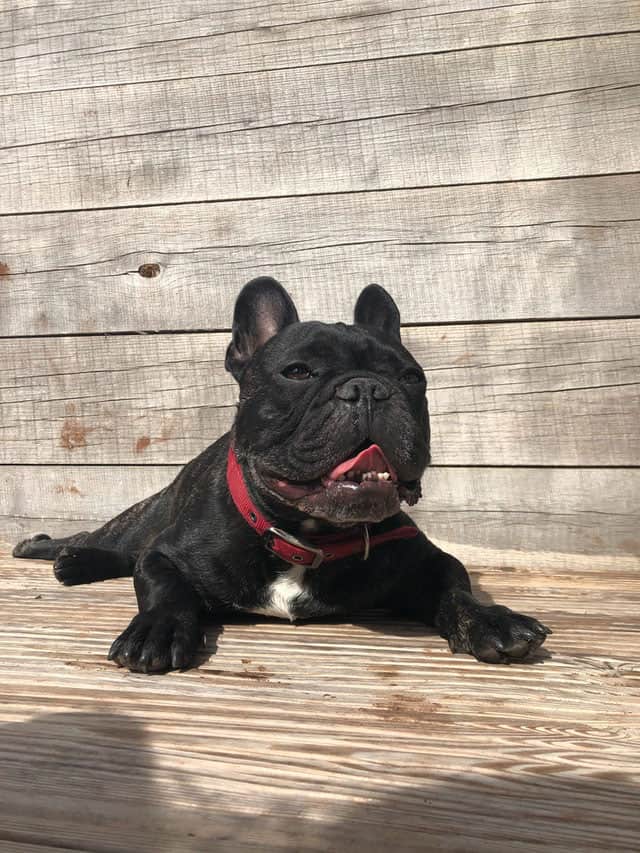Caring for your French Bulldog
As with most breeds, Frenchies need to be groomed on a regular basis to make sure their skin and coat are in the best possible shape. They need regular exercise and a good quality diet to ensure all their nutritional needs are met and they maintain a healthy weight. Any health concerns such as skin conditions or underlying health problems need to be addressed quickly before they get out of hand. If cared for well and properly, French Bulldogs will live relatively long and happy lives, so it is definitely worth doing your research before getting one.
Puppies
A French Bulldog puppy, like most puppies, is often boisterous and playful. Because of this they can sometimes take a while to train. In order to keep your puppy happy and interested in training, be stern and creative. Have a go at creating fun games and activities for them. That way it won’t even feel like training. It’ll just be a longer playtime!
To keep them happy, and to help them settle in, don’t leave them alone when you first bring them home. Ideally, you’ll stay by their side for the first two to three days. Make sure that someone else is around when you plan to bring them home, as this is a very stressful time in their lives, and they need all the love and support they can get to help them settle in to their new lives. Pups often struggle initially with being taken away from their siblings and mother. They often go from having an endless amount of playmates in a rowdy environment into a new quieter home. This can be very stressful for a puppy and make them feel vulnerable and anxious. Such times will make them more likely to play up.

If you’ve owned puppies before, you will know they can go from incredibly hyper to passed out in the blink of an eye, so make sure to set up a nice quiet area for your Frenchie to go to when they are in need of a nap. It’s also important to make this place feel safe for them to help them recuperate when they feel anxious or stressed. Treat a puppies bed as if it were their own room – it is a place they can go for a bit of alone time.
However, don’t make this place too isolated as they still like to know that there are people around. Try placing your dog’s bed somewhere people frequently travel through, such as the living room or the kitchen, that way, someone will always be close by. It’s also important that this place should not be treated as a place for punishment. Often people tell their dogs to go to their bed if they’ve been a little naughty, but this can influence your dog to think negatively of their bed, and you might find that they become increasingly reluctant to go there for down time. Try instead to send your dog somewhere more neutral, such as the corner of the room, or the back room where nobody goes for punishment.
As mentioned earlier, it is crucial to start a puppy’s training early. This will make them easier to train and more well-behaved in the long run. Training isn’t just a time to teach your pup cool tricks, it can also help them learn about obedience and what is expected of them as they grow up. This includes preparing them for grooming. Make sure they get used to you touching their paws, nails, and ears, and try to get them familiar with activities that might seem foreign to a new pup like teeth cleaning.
You should also get them used to wearing a collar as early as possible to avoid any future problems. Pups that aren’t used to collars can end up pulling on their leads when going out for walks and can even come to dislike the experience altogether. When getting your pup used to these things, ensure you are giving them plenty of praise and affection to let them know that they are doing the right thing. Just remember, these fun-loving dogs are more likely to cooperate if the experience is fun for them.
Seniors
As with humans, a French Bulldog will noticeably age physically, from garnering a few grey hairs, to their coat changing to a rougher and shaggier texture. As they age, the risk for developing certain health conditions also rises, so don’t start slacking on their care just because they’ve made it this far without any issues. Something could pop up at any moment.
As well as going grey, a Frenchie’s coats will often become coarser, they will lose stamina and strength, and they will lose a little muscle tone and definition. At this age their weight can fluctuate quite quickly from severely overweight to underweight, so keeping a close eye on their diet and exercise regime should be a high priority. French Bulldogs can suffer from arthritis and can have difficulty in regulating their body temperature. The latter means that extra care should be taken when exercising them in the summer months, and not letting them sit out in the warm weather for too long. Providing them with plenty of shade and cool drinking water is crucial, but so is keeping an eye on them for excessive panting or other heat-related behaviour.
There are not just physical changes that take place as Frenchies age. These dogs will change mentally as well. With age your Pooch might gain issues like having a lower pain threshold, becoming picky about food and responding less to external stimuli. This is often due to visual and hearing impairments. And just like a grumpy old person, Frenchies can become resistant to change and you may see their stubbornness really come into its own.
Having a French Bulldog of advanced years can mean taking on more responsibilities to keep them comfortable. Before bringing a French Bulldog into your home, consider your own capabilities and whether you will be able to commit to your French Bulldog at this stage in their life. This is something that should be considered before purchasing any dog, but

As a senior dog, they don’t need as much daily exercise as they once did, but you should pay more attention to their diet. This means they should be given easily digestible food, with a good protein content. Absolutely no food consumed by your senior dog should contain additives. Make sure your older dogs have access to as much clean water as possible in order to prevent kidney problems and keep an eye on what they’re eating, and they should be fine for a long time.
